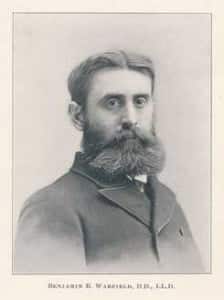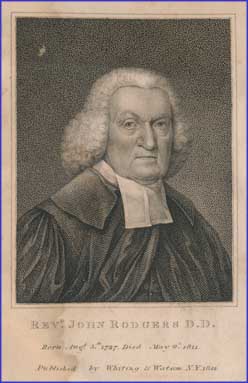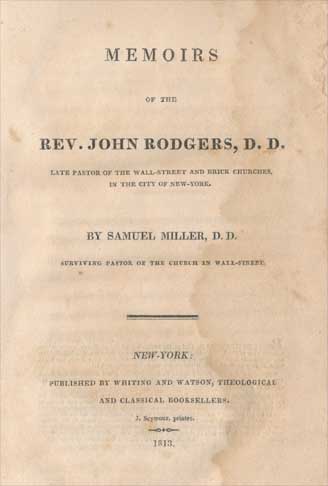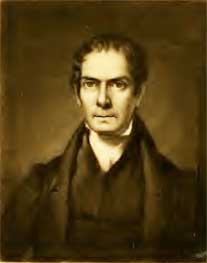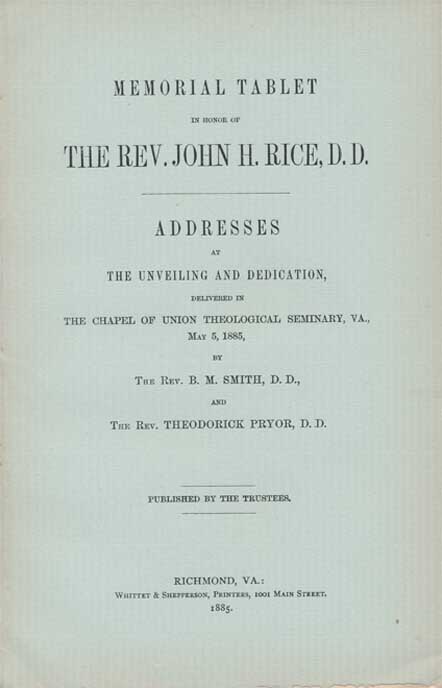The Beautiful Unity of Our Lives, Both Here and To Come.
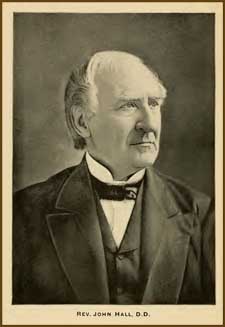 The Rev. John Hall, D.D. [1806-1894], died at his residence, 224 West State street, Trenton, N. J., on the morning of Thursday, May 10th, 1894. He had for 53 years served first as pastor and in retirement as pastor emeritus of the First Presbyterian Church of Trenton, New Jersey. His funeral took place on Saturday, May 12th. At the house a short service was conducted at 10:30 A. M. by the Rev. John Dixon, D.D., after which the remains were taken to the First Presbyterian Church, where the funeral service was held. The church was appropriately draped in mourning. The body as it was carried into the church was preceded by the Rev. John Dixon, D.D., the Rev. Frank B. Everitt, the Rev. S. M. Studdiford, D.D., the Rev. Walter A. Brooks, D.D., the Rev. A. Gosman, D.D., and the elders, deacons and trustees of the church.
The Rev. John Hall, D.D. [1806-1894], died at his residence, 224 West State street, Trenton, N. J., on the morning of Thursday, May 10th, 1894. He had for 53 years served first as pastor and in retirement as pastor emeritus of the First Presbyterian Church of Trenton, New Jersey. His funeral took place on Saturday, May 12th. At the house a short service was conducted at 10:30 A. M. by the Rev. John Dixon, D.D., after which the remains were taken to the First Presbyterian Church, where the funeral service was held. The church was appropriately draped in mourning. The body as it was carried into the church was preceded by the Rev. John Dixon, D.D., the Rev. Frank B. Everitt, the Rev. S. M. Studdiford, D.D., the Rev. Walter A. Brooks, D.D., the Rev. A. Gosman, D.D., and the elders, deacons and trustees of the church.
There, during the funeral service, Dr. John Hall [1829-1896], of New York City, made the following address :
Let us not forget the great purpose of a service like this; it is first of all for the acknowledgment of God, of His goodness, His wisdom and His grace. It is secondly, for the comfort of those who .shed the tears of natural affection because of the bereavement. And thirdly, it is for the edification of those who are gathered together here in sympathy with them in their sorrow, and in tender and loving memory of God’s servant who has been taken home to his heavenly rest. These things you will keep in mind, I trust, as you listen to the few sentences that it is my duty now to speak to you ; and I think you will be prepared to make some degree of allowance for the tender feeling that I cannot keep from my own mind as I think of the removal of him for whom I had so much affection and so much veneration.
Dear friends, we frequently speak of the journey of life; and the phrase is very suggestive. The journey is sometimes long. It was so in this case, extending over eighty-seven years ; it is sometimes brief. There are frequently difficulties on the way ; part of the road is sometimes uphill ; there are frequently precipices, and there are sometimes perils; but the Christian has this advantage : he has the Lord for his leader, and his steps are directed, one by one, by that good leader; and the end is the eternal home, and into that home God has taken His servant. The journey is completed. Let the lesson be impressed upon your heart and mine that if we want to make this journey of life happily and successfully we must take this same Leader for our Guide, even the Lord Jesus. Let us run with patience the race that is set before us ; looking unto Jesus, the author and finisher of our faith.
Life is sometimes spoken of as a battle, and the word is justified. There are many enemies, including the world, the flesh and the devil but thanks be to God, Christians are under a Leader; a competent leader. Christ is our leader in the battle of life. The armor of God is provided for us; we have to put it on, and to fight the good fight of faith, and the day will come when we shall say also, “Thanks be to God who giveth us the victory through our Lord Jesus Christ.” His servant had gained this victory ; the fear of death had been put away; faith conquered. He was taught to rejoice in the hope of the glory of God, and when the end comes, when the battle is over, it is to take one’s place in the company from which there comes up the song, “Thou has redeemed us and made us kings and priests unto God, and we shall reign forever and forever.”
There is another aspect, brethren, in which life may be looked at by us; it is the period of education for the eternal world into which we are going. The lessons are sometimes hard ; but the Christian has a blessed teacher. “Come unto me all ye that labor, and are heavy laden, and I will give you rest. Take my yoke upon you and learn of me.” That is the Son of God speaking to us. Learn of Him, and when we come and sit at His feet we are put in the way of getting the training that we need for the life that is everlasting. When we are being educated in the world here for this life there are appropriate books put into our hands, and there are books provided for us, dear friends, as we think of the life that is to come. There is the great volume of Providence. We study the work that God does, and we see His attributes.
There is the great volume of Creation ; ” the heavens declare His glory, and the firmament showeth His handiwork.” There is this work before me—the volume of revelation ; and as we study it we see Creation and Providence in a new and clear light ; and as we believe it, and take its truths to our hearts, the spirit of consecration is wrought in us by the power of the Holy Ghost, and we are prepared tor the joy and for the employments of that eternal world into which God is gathering His people.
Has it ever occurred to you what a beautiful unity is given to the life here, and the life beyond it, by being in the school of the Lord Jesus Christ? A text was read to you that suggested the idea “whether we live we live unto the Lord, or whether we die we die unto the Lord. Whether we live, therefore, or die, we are the Lord’s.” Here He is training us, teaching us, educating us, sanctifying us as His children ; putting into our hearts the spirit of adoption; there we shall have the inheritance that is incorruptible and undefiled, and that fadeth not away. Need I tell you, dear friends, that these are the sources of true comfort and consolation when God takes from us those to whom we look with tenderness and gratitude and affection? I know how many of you there are here that have just these feelings toward our brother, whose course on the earth has closed. It is no wonder that you do so regard him ; his life from the beginning of it has been a process of happy and effective training; and it has been a blessing to many. He has served his generation by the will of God.
Words to Live By:
To say it again, “Has it ever occurred to you what a beautiful unity is given to the life here, and the life beyond it, by being in the school of the Lord Jesus Christ?” Our Savior watches over us, often in ways we will never know, at least in this life. Labor not to hinder that glorious work, as He trains, teaches, educates and sanctifies us as His children.
The full text of the Memorial for Rev. John Hall may be read here: https://archive.org/details/memorialrevjohnh00dixo/page/n8
Additionally, a number of works by the Rev. Hall can be found online at The Log College Press. These include:
Milton’s Familiar Letters (1829)
The Life of Rev. Henry Martyn (1831)
The Chief End of Man: An Exposition of the First Answer of the Shorter Catechism (1841)
Minor Characters of the Bible (1847)
The Examples of the Revolution (1859)
History of the Presbyterian Church in Trenton, N.J. From the First Settlement of the Town (1859)
Forty Years’ Familiar Letters of James W. Alexander, D.D. (1860, 1870)

